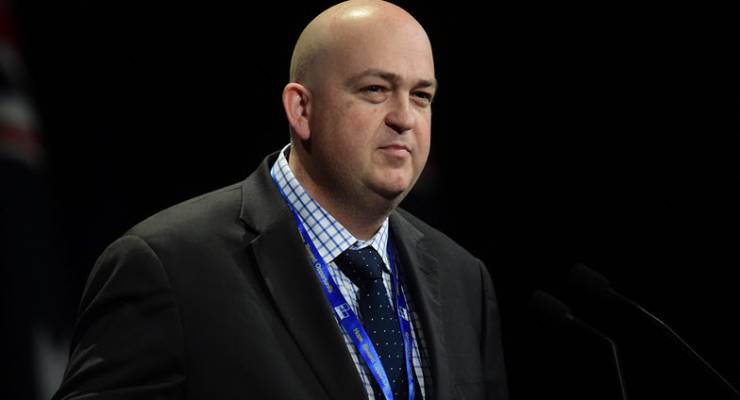
New WA senator Slade Brockman
Last weekend, Western Australian Liberals selected Slade Brockman to replace the staunch conservative Chris Back in the Senate. Like Back, Brockman is also a conservative, and has already flagged that he would ignore the results of any plebiscite in favour of marriage equality to vote against it being legalised.
Meanwhile, one of Brockman’s soon-to-be colleagues Dean Smith continues to press on with plans to overturn or bypass the Liberals’ plebiscite policy by bringing a private member’s bill on marriage equality to the Parliament.
Smith is another conservative from Western Australia, but also the Liberal Party’s first openly gay parliamentarian. He told an interviewer earlier this month that he was originally opposed to same-sex marriage but then “came to the realisation that the fears people had were unfounded about same sex marriage” and that “if the virtues of marriage are so strong and enduring as I believe they are, then it made sense to share the institution with same-sex couples.”
Smith’s challenge is to navigate his bill into the Liberal party room, creating an opportunity for the party’s plebiscite policy to be dropped in favour of a free vote on the matter. The debate would have to be initiated from the floor of the meeting, to avoid any suggestion that Malcolm Turnbull had given his imprimatur for the move.
The difficulty for the PM is that his 2015 Coalition deal with the Nationals is reportedly based on his continued support for the plebiscite. The only way for the plebiscite policy to be changed to a free vote is for the party room to overturn it. However, the PM is responsible for putting together the party room agenda; hence the need for Smith to “ambush” the meeting with a motion from the floor to bring on debate.
[Marriage equality postal plebiscite plans are much further along than you think]
Also important is the need for Smith to do so at a Liberal rather than a Coalition party room meeting, where the presence of Nationals MPs would increase the proportion of conservatives (and same-sex marriage opponents) in the room and diminish the chance for the policy to be overturned.
If the plebiscite policy were dropped by the Liberal party room in favour of a free vote, Nationals MPs would undoubtedly be livid (as would Abbott supporters). Yes, the Coalition agreement might even be at risk, although it’s hard to imagine Nationals ministers would be prepared to give up their cosy sinecures.
But it wouldn’t be the end of the world (or the government) if the Nats walked away from the Coalition for the remainder of this parliamentary term. That is, as long as the party guaranteed confidence and supply. Nationals leader Barnaby Joyce would also have more flexibility to woo One Nation voters by emphasising the difference between his party and the Liberals.
Liberal MPs who support marriage equality are already shaping up for the party room battle. One suggested to a journalist this week that they planned to use a statement by former Liberal leader Tony Abbott to neutralise his opposition to a conscience vote. After striking the plebiscite deal in the Coalition party room back in August 2015, Abbott said to the media “I have come to the view, I believe this is the party room view, that this is the last term in which the Coalition party room can be bound, although we will definitely maintain the current position for the life of this term. Going into the next election, we will finalise another position.”
Smith and other Liberal supporters of marriage equality will argue that now is the time to finalise that other position. Abbott will argue the contrary, as he did on social media, claiming that “[Liberals are] not bound on the issue but we are honour bound to the electorate on the process for this term of parliament”.
The former PM’s comment points to another difficulty for Smith: voters have been led to believe they are entitled to have a say on marriage equality and will be unhappy if that “right” is taken away. High levels of support for the plebiscite may be based on the voters’ expectation that MPs will be bound by the plebiscite result. An opinion poll last week suggested this, finding that support dropped to single digits if the outcome was not binding on Parliament.
[Turnbull needs to get marriage equality off the agenda]
And even if it was, there are MPs like Slade Brockman who would defy any plebiscite that supported gay marriage. Other MPs, such as conservative Liberal Craig Kelly, have suggested they’d vote on marriage equality according to their (conservative) electorate’s view, not necessarily according to the national outcome.
So whether Smith manages to change the Liberal Party policy or not, it will be important to neutralise the unrealistic community assumption that a plebiscite equals marriage equality.
The final hurdle for Smith will be whether he has the numbers to pass the private member’s bill. Most analysis of the scenario counts the vote of Labor MPs as a homogenous bloc, concluding that Smith needs only a few additional Liberals to reach a majority.
However, at least one Labor MP in the House of Representatives is still on the record as being opposed to marriage equality. So is Bob Katter. And another three Labor MPs in the lower house have undeclared positions.
Given the close numbers in the house, that’s up to another five votes in favour of marriage equality that Smith will have to find from Liberal Party ranks. This will be considerably difficult if the Liberal party room does not change its policy to allow a conscience vote.








This issue has gone on for long enough. Move on boys, it’s going to become accepted sooner, rather than later. Time to put your collective minds to fixing-up inequality of incomes, climate change: important stuff like that.
I honestly don’t think the public is keen to vote on this issue in a plebiscite. If you ask the average voter if they’d like a say on anything, that’s a yes. But as you pointed out, when it’s explained the plebiscite would be non-binding, people are not keen at all. Really they just want the issue dealt with.
I’d rather a plebiscite on whether big business should pay more tax, amongst other things.
The legislators would ignore the result if the populace didn’t get it right – who the hell do the people think they are, the owners?
Quote: “has already flagged that he would ignore the results of any plebiscite in favour of marriage equality to vote against it being legalised.”
Ah, yes, our leaders are elected to govern and appropriately pass laws.
They now won’t do what they have been democratically elected to do, because the people are supposedly entitled to a say in how the laws are shaped.
If the people say something different to what their elected representatives want to hear, they will be ignored.
Isn’t Australia’s democracy and leadership great?
Brockman? Isn’t he the tabloid newscaster from the Simpsons? What happened to his blonde flattop?
Is this the first piece from this author that wasn’t a puff piece for Talcum?